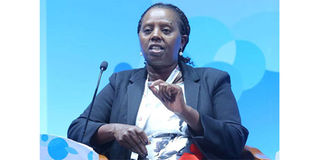New toolkit to boost women’s participation in Wash

East African Breweries Limited CEO Jane Karuku. East African Breweries Limited (EABL) has partnered with Care International in Kenya (CIK) to launch a community engagement toolkit for women’s equal participation in water, sanitation and hygiene (Wash).
What you need to know:
- East African Breweries Limited has partnered with Care International in Kenya to launch a community engagement toolkit for women’s equal participation in water, sanitation and hygiene.
- It introduces two new measures – gender-equal representation on community water committees and community dialogues – to tackle barriers to women’s equal access to and agency over Wash.
East African Breweries Limited (EABL) has partnered with Care International in Kenya (CIK) to launch a community engagement toolkit for women’s equal participation in water, sanitation and hygiene (Wash).
It introduces two new measures – gender-equal representation on community water committees and community dialogues – to tackle barriers to women’s equal access to and agency over Wash.
The toolkit will be used by EABL employees and delivery partners that design and implement community Wash programmes, allowing them to integrate this approach into surfacing and addressing social norms as part of future projects.
Also read: Hygiene key to public health
“At EABL, our target is to reach 50 per cent female beneficiaries in community programmes by 2030. We, however, recognise that our commitment to gender-equal representation on committees might confront prevailing social norms and deeply held beliefs around gender roles. This community engagement toolkit will facilitate meaningful conversations around these potential tensions responsibly and without harm,” said Jane Karuku, EABL chief executive, during the launch of the toolkit last week.
“Water is our most important ingredient. Preserving Water for Life is part of our sustainability strategy and outlines how we manage water in our supply chain, operations, and communities, as well as advocate collective action to improve water outcomes. The launch of this toolkit reaffirms our commitment to shifting our programmes towards gender-transformative approaches.”
Maureen Miruka, Care International Kenya country director, said gender equality approaches and risk mitigation must be embedded in standardised programme design practices for all community projects.
“Despite women having accumulated considerable knowledge of water resources, ranging from quality and reliability to acceptable storage methods, they are disproportionately impacted by poor management of water systems. Consequently, their capabilities are affected, and they often miss out on education, income generating activities, and are further limited in participating in political activities.”





